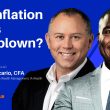by William and Cole Smead, Smead Capital Management
The investors in the Smead International Value Fund have asked our team at Smead Capital Management what looks attractive today. To help explain this conversation, we’d like to teach you about a personal story of mine that is a good allegory to explain this.
My direct family (wife, kids and myself) often get away on vacation to the Lake Tahoe/Reno area. Due to the rental car situation that followed the pandemic, we were paying an obscene price to rent cars. We did some math and figured out that we would be better off just purchasing a car for our trips there. We landed on a 2019 F-150 with double bench seats (which fits all six of us). Autos haven’t often rewarded you to be an owner, but the truck wasn’t the best part looking back. When we looked into the financing, a major bank was willing to provide us with a 72-month loan at 2.19%. We bought the truck with the financing, roughly one year ago now. Today, inflation continues to run across the economy causing rates to rise. This has me “humming all the way to Reno.”
Humming all the way to Reno
You’ve dusted the non believers
And challenged the laws of chance
Now, sweet
You were so sugar sweet
You may as well have had ‘kick me’
Fastened on your sleeve
The Federal Reserve was providing money far too cheaply at that time. The inflation that is proving to be sticky has “dusted the non-believers and challenged the laws of chance.” The fact that a person of creditworthiness could borrow money at a rate that one year later would make central bankers get jealous, exposes how peculiar today’s markets have been. We need to be thoughtful as investors about how we can profit from these oddities.
As macro-economic fears swirl globally, pundits and wall street analysts are telling everyone where they don’t want to be in the impending recession. They are putting “kick me” signs on a myriad of our businesses. Examples of a few of these industries that we see in and outside of our portfolio include automakers, lumber companies, retailers, retail properties, and homebuilding. The non-staple businesses are being run away from. Interestingly, these businesses are capital-intensive or have had no new competition for quite a while due to the pandemic.
You know what you are
You’re gonna be a star
You know what you are
You’re gonna be a star
In our opinion, finding asset-rich businesses that are self-funding with low-cost capital structures (cheap debt) is the most interesting investment to make. You get the cover of macroeconomic fears as your discount tool to be the buyer. However, as the cost of capital rises and economic fears dissipate over the next few years, you are likely to have fewer competitors as operating costs and funding pressure keep new entrants out. We believe that this profile of stocks trading in international equity markets is “gonna be a star.”
Wing is written on your feet
Your Achilles heel is a tendency to dream
But you’ve known that from the beginning
You didn’t have to go so far
You didn’t have to go
Our ownership in Volkswagen, Porsche SE and Porsche AG may be the perfect picture of this. First off, below is a diagram that my colleague Seamus Sullivan put together to look at the corporate structure of these entities.

We own the non-voting preference shares of VW AG (VOW3 GY), the non-voting preference shares of Porsche SE (PAH3 GY) and now the non-voting shares of Porsche AG (P911 GY). We do not directly own shares in Traton, which is publicly traded in the graphic above. There is a bevy of assets inside these corporate structures. Rather than looking at the assets, let’s invert this and look at the liabilities.

As you look at the funding of this structure from debt, you begin to see where hidden assets are. They have over $15 billion of callable, perpetual bonds. Outside of these, there is over $35 billion of debt with an average coupon of roughly 3% and a weighted average maturity of 4.42 years. What would we have to pay to borrow this money today?
As of the date of this letter, the US government is paying 4.27% on five-year notes. The UK government is paying 4.32% on five-year Gilts. If we tried to borrow money in a European investment-grade corporate structure today, we would be paying 4.73%. This means that if VW wanted to refinance this debt, the debt owners would pay us to get out of earning 3%. If you were to look at these bond prices, they would be below par. Therefore, VW bonds are trading at a lower price than what is shown on the balance sheet. This would imply we have more net worth (book value per share), though the balance sheet doesn’t reflect that yet. We don’t need to have “a tendency to dream” to fantasize about what the perpetual bonds are worth!
You know what you are
You’re gonna be a star
You know what you are
You’re gonna be a star
If Oliver Blume, the CEO of both VW AG and Porsche AG, called us up and asked us what we think of the position they are in. We would reply “You know what you are. You’re gonna be a star.” If thinking about liabilities as an actual asset doesn’t wet your whistle, let’s get to the brass tacks from the structure of the assets above. VW (VOW3) currently owns 75% of Porsche AG (P911). Half of the Porsche AG IPO is coming back to VW shareholders in a special dividend of roughly $9.25 billion. Porsche AG is currently valued at $77.3 billion.
This would imply that the rest of Volkswagen (that includes assets like Skoda, the remainder of Traton, Bentley, Lamborghini, Audi and Ducati) is worth less than $5 billion. To add insult to injury, Porsche SE is the largest owner and controller of VW. They trade at a discount to their VW and now Porsche AG ownership. It’s a double discount compared to VW. The crystallization of value from the Porsche AG IPO has made these stocks “Now, sweet.” As owners of Porsche SE and VW over the last four years, our investors would say that these “were so sugar sweet.”
In a world where stock picking is treated with ill repute, all an investor can ask for is a cheap business that has great economics. That comes today in asset-rich, well-financed businesses like VW, Porsche SE and Porsche AG. With the Porsche and Piech families controlling these entities, we have the legacy of successful billionaires doing our bidding to allocate the capital. What would we want beyond a situation like this? Probably a cheap truck at 2.19% financing. If we have this, we will be “Humming all the way to Reno.”
Fear stock market failure,

_______________________________________________
The recent growth in the stock market has helped to produce short-term returns for some asset classes that are not typical and may not continue in the future. Margin of safety is the difference between the intrinsic value of a stock and its market price. The price-earnings ratio (P/E Ratio or P/E Multiple) measures a company’s current share price relative to its per-share earnings. Alpha is a measure of performance on a risk-adjusted basis. Beta is a measure of the volatility of a security or a portfolio in comparison to the market. FAANG is an acronym for the market’s five most popular and best-performing tech stocks, namely Facebook, Apple, Amazon, Netflix and Alphabet’s Google. Growth investing is focused on the growth of an investor’s capital. Leverage is using borrowed money to increase the potential return of an investment. Momentum is the rate of acceleration of a security’s price or volume. The earnings yield refers to the earnings per share for the most recent 12-month period divided by the current market price per share. Profit margin is calculated by dividing net profits by net sales. Quality is assessed based on soft (e.g. management credibility) and hard criteria (e.g. balance sheet stability). Value is an investment tactic where stocks are selected which appear to trade for less than their intrinsic values. The dividend yield is the ratio of a company’s annual dividend compared to its share price.
The information contained herein represents the opinion of Smead Capital Management and is not intended to be a forecast of future events, a guarantee of future results, nor investment advice.
Smead Capital Management, Inc.(“SCM”) is an SEC registered investment adviser with its principal place of business in the State of Arizona. SCM and its representatives are in compliance with the current registration and notice filing requirements imposed upon registered investment advisers by those states in which SCM maintains clients. SCM may only transact business in those states in which it is notice filed or qualifies for an exemption or exclusion from notice filing requirements. Registered investment adviser does not imply a certain level of skill or training.
This newsletter contains general information that is not suitable for everyone. Any information contained in this newsletter represents SCM’s opinions, and should not be construed as personalized or individualized investment advice. Past performance is no guarantee of future results. There is no guarantee that the views and opinions expressed in this newsletter will come to pass. Investing in the stock market involves gains and losses and may not be suitable for all investors. Information presented herein is subject to change without notice and should not be considered as a solicitation to buy or sell any security. SCM cannot assess, verify or guarantee the suitability of any particular investment to any particular situation and the reader of this newsletter bears complete responsibility for its own investment research and should seek the advice of a qualified investment professional that provides individualized advice prior to making any investment decisions. All opinions expressed and information and data provided therein are subject to change without notice. SCM, its officers, directors, employees and/or affiliates, may have positions in, and may, from time-to-time make purchases or sales of the securities discussed or mentioned in the publications.
This Newsletter and others are available at smeadcap.com












